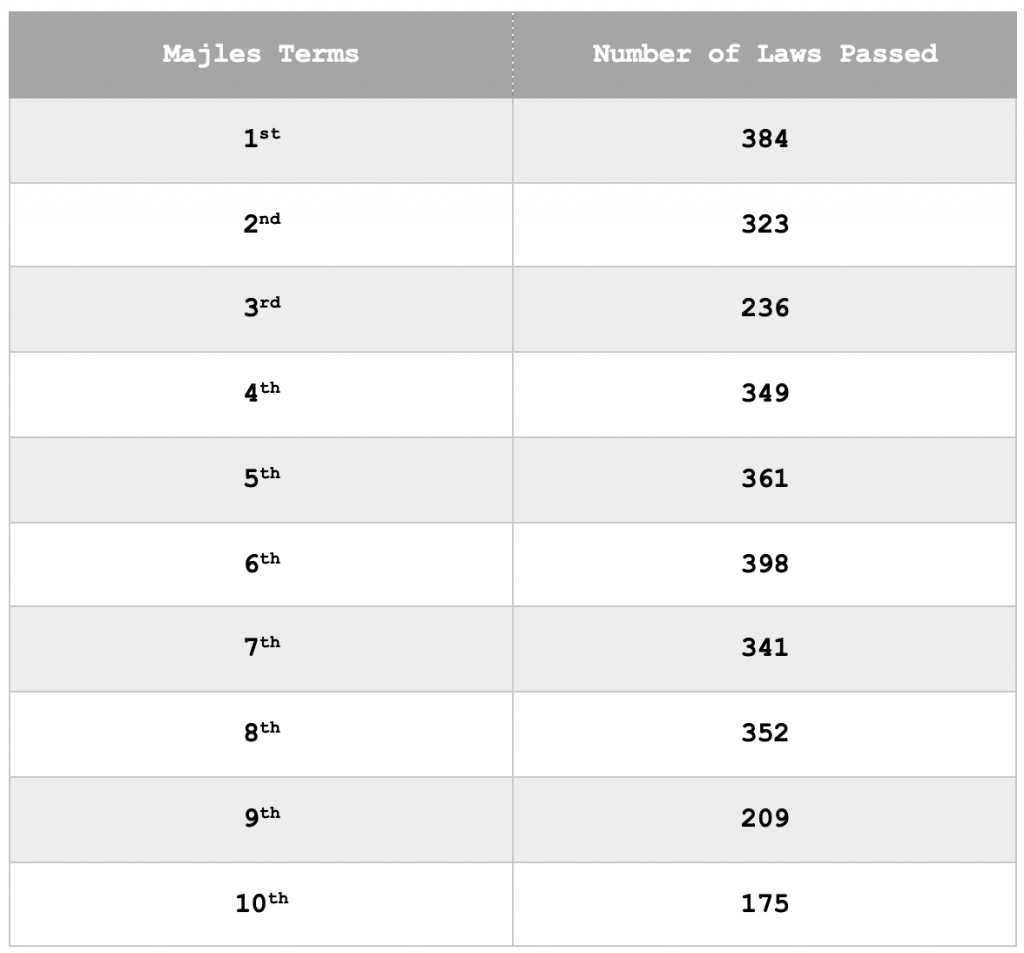The last session of Iran’s 10th Majles was held on May 20, 2020. The term of the 10th Majles began with the “reformists” claiming a majority, but this current never won more than 102 out of 290 seats. During this term, Iran experienced a number of developments: the brutal crackdown on protesters in January 2017 and November 2019, President Trump’s withdrawal from the JCPOA, flooding in April 2019, the assassination of Qassem Soleimani in January 2020, the downing of the Ukrainian jetliner in January 2020, and the global health COVID-19 pandemic in February 2020, which is continuing to impact the country to date.
The 10th Majles did not act in response to the aforementioned developments, except after the death of Soleimani. The 10th Majles added 200 million euros to the budget of the Quds Force to express its solidarity in the aftermath of the killing of its commander and to highlight its support for Iran’s regional mission.
During the term of the 10th Majles, 175 laws were passed. The Majles proposed 69 bills, whereas 106 were government bills. The number of laws passed was the lowest in the history of the Majles since the 1979 revolution. The chart below indicates the number of laws passed during the past 10 terms of Iran’s Majles.

Despite many candidates promising much during their election campaign, the 10th Majles did not achieve much in the sphere of civil and constitutional rights, except for granting citizenship to the children of Iranian women who had married foreigners and lowering the penalty for drug traffickers. Under the first law, children with foreign fathers who were born before or after the law was passed could acquire Iranian citizenship at the request of their Iranian mother if there was no security issue. According to the second law, the penalty for most drug traffickers was reduced from death to life imprisonment.
However, it is important to note that neither law was introduced on the back of human rights concerns. The first law was passed due to the military establishment demanding that citizenship be granted to the children of Afghan mercenaries who fought for Iran in Syria and married Iranian women. The second law was passed due to the government’s intention to reduce international and UN pressure on it over the issue of executions. Prior to the enactment of this law, Iran’s execution rate was among the highest in the world.
In the sphere of governance, the 10th Majles was as corrupt as those before with lobbying, backroom deals, and the abuse of power apparent. It passed two significant bills: the Election Campaign Transparency bill and the FATF bills. According to the first bill, which was passed at the end of the 10th Majles’ term and was not observed during the 11th Majles’ elections, cash or non-cash donations to finance and fund election activities must be transparent and candidates must designate a financial representative to highlight their expenses and spending. From 2016 to 2018, the 10th Majles passed the FATF bills: the Anti-Terrorism Financing Amendment Bill, the Anti-Money Laundering Amendment Bill, the Palermo Bill, and the CFT Bill. The first two bills were approved by the Guardian Council, but the third and fourth bills were rejected in the Expediency Discernment Council.
With regard to the annual budget, the 10th Majles allocated more than 70 percent of the budget to Iran’s military institutions, state-owned companies, and government institutions such as the Guardian Council and the Expediency Discernment Council. The 10th Majles had no say in the country’s foreign policy and nuclear and missile programs. In addition, it was not involved in the development of the country’s expansionist plans and schemes in the region. Its only entry into the sphere of foreign policy was when it undertook reciprocal action against the US declaration of the IRGC as a terrorist organization.
The 10th Majles was absent from overseeing the executive branch and institutions under the supreme leader’s control. Ali Larijani, the Speaker of the 10th Majles said: “The Majles sent 10,000 warnings to the president and ministers, 3,000 questions to ministers, and raised 183 questions in the house. There were also five questions asked from the president and six ministerial impeachments in Parliament, two of which failed to win a vote of confidence; 63 times officials were invited to explain.”
The 10th Majles did not have any success in investigating state institutions. Due to the close proximity of the 10th Majles members to Rouhani’s administration, it was reluctant to investigate the executive branch; with regard to the institutions under the supreme leader, the 10th Majles had no power whatsoever to investigate these organizations.
